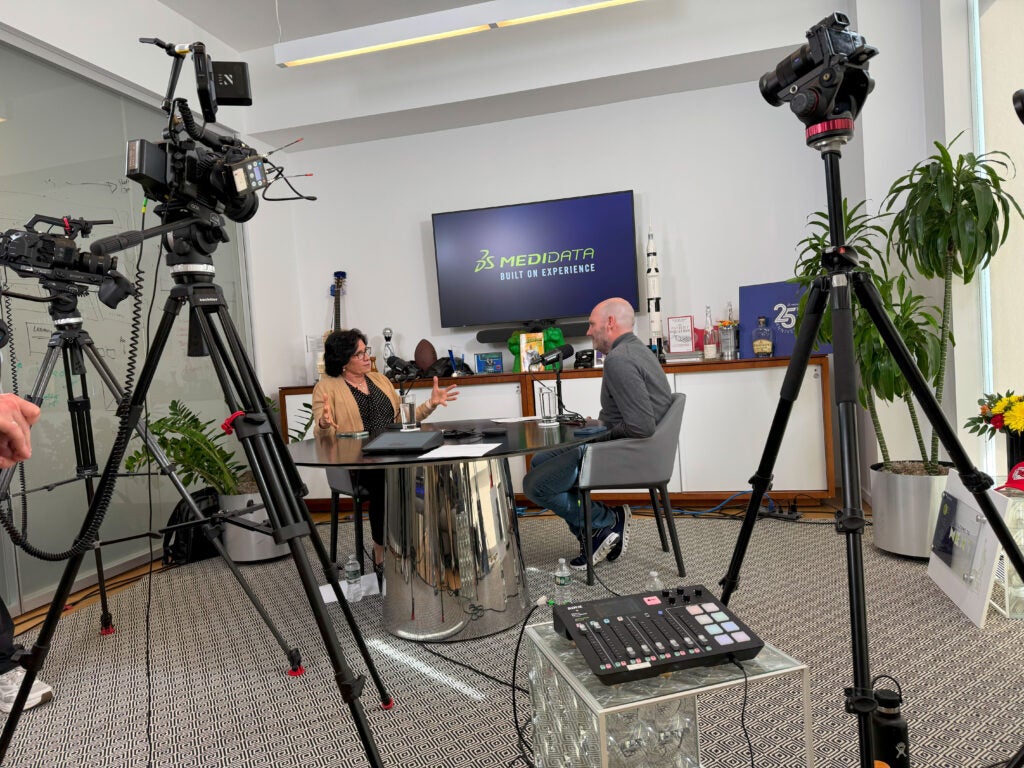Marisa Co Talks AI, DCTs and the Future of Life Sciences

Welcome to the Clinical Minds “Innovator Insights Corner,” where we’ll be sharing fascinating stories, perspectives, and predictions from the guests of ‘from Dreamers to Disruptors’, a podcast by Medidata exploring life sciences innovation and the visionaries behind it all.
Healthcare and technology have always been closely related. New developments in data management and analysis have transformed our understanding of human health and how we treat diseases. The challenge we often face is not how important or effective new technologies are, but rather how we adopt them into the understandably risk-averse life sciences industry.
Over a long and storied career, Marisa Co has honed her ability to identify cutting-edge tools that can drive life sciences forward—and convince the right people to take a chance on them. From Bristol Myers Squibb and Amgen, to decentralized clinical trials (DCTs) pioneer Mytrus, Marisa has left her mark on the industry.


The Patient Experience
The ultimate goal of clinical trials, and the broader healthcare ecosystem, is to create the best outcomes for patients. Everything we do at Medidata is seen through this lens. Are our trials as convenient, transparent, and accessible as possible? Do the patients taking part feel empowered and supported? Are the treatments we deliver the most effective for a diverse range of people?
Like many of us, the opportunity to make a difference for patients is a driving factor for Marisa.
“In 2007, I left [the] industry for the first time and needed a breather, and I started joining different angel investment groups and being exposed to different technologies and innovation,” she tells Medidata CEO Anthony Costello. “That's when I was introduced to Dr. Susan Love, the famous breast cancer doctor. And she had invested in a company called 1747 that was trying to build a clinical trial online, with the hope to give better access to patients on clinical research.”
This encounter led Marisa to contribute to a new model for studies—one that has expanded the opportunities for patients to take part in research on their own terms: DCTs.
Decentralized Clinical Trials
DCTs are transforming our approach to clinical trials by fundamentally reimagining how we structure and organize them. Studies have traditionally been built around a site, where patients would travel regularly to meet with clinicians, receive treatments and tests, and report back on their outcomes. DCTs let many of these activities occur remotely, whether at more conveniently located healthcare facilities or even in the patients’ home. This extends access to a broader range of patients who might not be able to attend sites, as well as making trials more sustainable by reducing the amount of travel necessary to run them.
Digitization of trial processes and cloud adoption have been key drivers of the growth in DCTs, which was also accelerated by COVID. Our reduced ability to travel to sites during lockdowns coincided with a clear need to increase clinical trial activity to develop effective COVID treatments.
Mytrus, where Anthony served as CEO, was an early innovator in what they originally called ‘virtual trials,’ exploring how to adopt technologies to enable remote participation in studies. “We had the first approval ever for shipping study supplies directly to patients at home,” says Marisa, “which had never been done before, because we were sending an investigational drug to patients to take on their own. That was very new and innovative at the time.”
“I remember talking to heads of clinical operations [about DCTs] and them telling me, ‘There's no way. It will never happen.’ I have the words stuck in my mind. That's the worst thing that you can tell me—that it will never happen.”
– Marisa Co
Marisa, Anthony, and their Myrtus colleagues had numerous challenges to overcome—from enabling patient enrollment and access through the internet, to the logistics of delivering the right tools and technologies to where they needed to go. But they succeeded, and today DCTs are a common part of the clinical research landscape.
eConsent
Fundamental to clinical trials is the concept of consent; patients must signal that they clearly understand the parameters and goals of the trial and enter into an informed agreement that they’re willing to participate.
Electronic informed consent (eConsent) is a system that provides a user-friendly interface for patients, as well as automated patient onboarding. Collecting and storing this consent electronically (rather than by older, paper-based methods), allows us to better track data, automate processes, and identify errors earlier.
A key aspect of eConsent is that it can be captured remotely, making it a vital element of DCTs and something that Mytrus had to explore. Securing regulatory buy-in across different regions was an essential part of ensuring the project’s success.
“We were talking to Bob Temple at the FDA, because we wanted to ensure that the FDA would be supportive of this. He said, ‘It took decades for somebody to figure out that the patients don't want to read a 150-page protocol.’ [Faced with] the idea of having an iPad that would explain this with icons and in a very simple way, Bob Temple said, ‘What took so long? This is precedent-setting.”
– Marisa Co
Despite the benefits of eConsent, it’s yet to become an industry standard. “Even with all of those great innovations and a technology that could really change the market, things like eConsent have been relatively slow in an adoption curve,” says Marisa. “Even today, we still have a very low overall percentage of trials that are using electronic consent. You can get something new and innovative and validated by lots of different parts of the market, and still, in our industry, have a challenging time actually getting to the steady part of the hype curve where everyone's using it.”
AI in Clinical Trials
AI has many applications for clinical trials—some have already been adopted, while others are only just beginning to be understood. As an advocate for technological adoption and advancement in life sciences, Marisa is keenly interested in AI’s potential.
She and Anthony see key opportunities to harness AI in clinical trials for the benefit of sponsors, sites, and patients. One is efficiency—the ability to automate the time-consuming and repetitive tasks that all studies involve. “All of a sudden you take, I don't want to say mundane, but things that take less work, or less brain power, and you leave the computers or AI to do that,” says Marisa. “Then your precious people can focus on higher-level activities, which I think everybody would appreciate."
“If we can't catch AI adoption up with the innovation—because it takes too long to validate or to get over that risk aversion and actually try these new things—then it creates a big challenge.”
– Anthony Costello
Another major benefit of AI is its ability to assess vast amounts of clinical data and pull out insights and possible treatments that we would never have the time or capacity to do manually.
“Five years ago, the concept of delivering or creating drugs through AI was unheard of,” says Marisa. “Now we have 150 compounds that were AI-touched going into the clinic or in the clinic already. Who in the world would have thought that would be the case?”
Listen to Marisa Co and Anthony Costello’s full conversation in from Dreamers to Disruptors Episode 3 to dive deeper into the latest developments in AI and DCTs—and how we can accelerate their adoption across life sciences.
Contact Us
